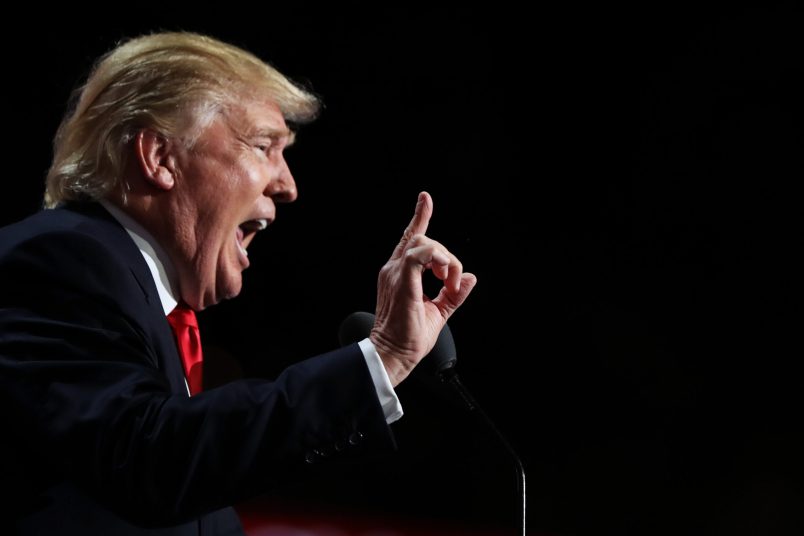The D.C. Circuit Court of Appeals cast Donald Trump as a “significant and imminent threat” to the functioning of his Jan. 6 trial in a unanimous ruling that largely kept the overwhelming GOP frontrunner gagged.
The appeals court smacked Trump hard for his ongoing pattern of threatening witnesses. And even though the appeals judges partly vacated U.S. District Judge Tanya Chutkan, they went out of their way to pepper the ruling with compliments on how she was handling the case and the immense difficulty of the task which faces her. The court also framed its ruling as pushing back against an assault on the rule of law by Trump as he seeks separate treatment thanks to his ongoing campaign to return to the presidency.
“We do not allow such an order lightly,” D.C. Circuit judge Patricia Millett wrote, of the gag order. “Mr. Trump is a former President and current candidate for the presidency, and there is a strong public interest in what he has to say. But Mr. Trump is also an indicted criminal defendant, and he must stand trial in a courtroom under the same procedures that govern all other criminal defendants. That is what the rule of law means.”
The appeals court left most of the original gag order in place, including a provision that Trump cannot speak about witnesses’ and their participation in the case. But it also narrowed the order slightly. Now, Trump can speak about Special Counsel Jack Smith. Comments on attorneys in the case are only banned if they are “made with the intent to materially interfere with, or to cause others to materially interfere with, counsel’s or staff’s work in this criminal case, or with the knowledge that such interference is highly likely to result.”
Throughout the opinion, the appeals court evinced a deep understanding of how Trump has operated over the past several years towards witnesses, judges, prosecutors, and opposing parties in legal proceedings against him. He publicly lashes out at them in ways which result in mass harassment.
Millett recounted the stories of several people who had “had their lives turned upside down after coming within Mr. Trump’s verbal sights.” That included the account of two Georgia election workers who Trump and Rudy Giuliani smeared as responsible for committing voter fraud which led to his defeat in the state, leading to massive harassment and threats.
Millett also wrote that Judge Chutkan was affected by Trump’s attempts to “denigrate and attack” those involved in the case.
Trump posted on Truth Social the day after his initial court appearance, “IF YOU GO AFTER ME, I’M COMING AFTER YOU!” before calling Chutkan a “biased, Trump-hating judge” among other things.
The next day, the appeals court wrote, a Trump supporter “called the district court judge’s chambers and said: “Hey you stupid slave n[*]r[.] * * * If Trump doesn’t get elected in 2024, we are coming to kill you, so tread lightly b[]h.”
Later on in the opinion, Millett made clear her view of whether these consequences were intentional.
“Mr. Trump himself recognizes the power of his words and their effect on his audience, agreeing that his supporters ‘listen to [him] like no one else,'” Judge Millett wrote.
Trump also lost on an important point.
He had argued that because he is running for president, the appeals court should treat his running commentary about the trial as an issue core to his campaign – classic political speech, not to be reined in except for the direst of cases.
Here, the appeals court acknowledged that the First Amendment gave Trump a “robust” argument on this point. But it rejected his argument nonetheless, finding that Trump’s involvement in a political campaign can’t affect “the court’s historical commitment or obligation to ensure the fair administration of justice.”
Per the terms of his initial release, Trump, like all criminal defendants, had to agree not to speak with witnesses about the case. “He cannot evade that legitimate limitation by dressing up messages to witnesses in political-speech garb,” Millett added.
The appeals court only limited the order after commending Chutkan on her handling of the case.
“We fully credit the district court’s care and efforts while handling this complex case to bring the Order within First Amendment bounds,” the panel wrote.
The appeals court was willing to take Trump’s status as a national politician into account. Barring Trump from speaking about the special counsel or witnesses has the potential to undermine him as a candidate, Millett wrote. A former Joint Chiefs of Staff chairman, for example, could both be a witness in the case and publish a memoir about his experience working with Trump. Under the original order, Trump could not respond. Similarly, Millett wrote, Trump’s “opponents could without restriction wield the indictment and evidence in the case to demonstrate his unfitness for office” with the former president being hamstrung in his ability to reply.
That, Millett wrote, would “unfairly skew the political debate” without protecting the trial.
Trump’s campaign seized on that portion of the order in a statement, saying that the appeals court had “determined that a huge part of Judge Chutkan’s extraordinarily overbroad gag order was unconstitutional.”
In reality, most of the order remains in place. Trump, the appeals court found, knows exactly what he’s doing.







Let him attack Jack… fine by me. It’s not helping him
I have to assume Donnie gets some satisfaction from being unseemly and shrill.
TFG has been on a leash for quite some time.
The more he carries on, the more I picture this being at the heart of it.
That makes it unanimous nationally, doesn’t it?
Is there anyone left who doesn’t believe it? Anyone in the entire world?